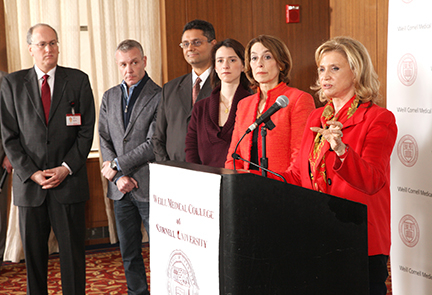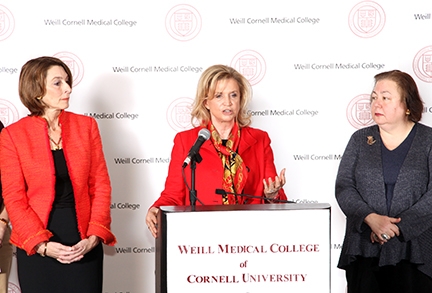
Dr. Laurie H. Glimcher, U.S. Rep. Carolyn Maloney, and state and local elected officials, as well as physicians, scientists, patients and medical students at a press conference about sequestration hosted at Weill Cornell Sunday. All photos: Richard Lobell
Biomedical research at Weill Cornell Medical College, as well as at other academic medical centers across the nation, will be devastated if Congress doesn't stop the looming across-the-board spending cuts set to take effect this Friday.
That was the message imparted during a press conference on Sunday by U.S. Rep. Carolyn Maloney and hosted by Weill Cornell Medical College and Dr. Laurie H. Glimcher, dean of Weill Cornell.
State Sen. Liz Krueger, state Assemblyman Micah Kellner and city Councilwoman Jessica Lappin, as well as physicians, researchers, patients and students from Weill Cornell, joined the press conference to draw attention to the automatic $85 billion in federal cuts, known as sequestration, which could take effect on March 1. New York State's biomedical research institutions, which include Weill Cornell, stand to lose $167 million in funding from the National Institutes of Health (NIH) if cuts to the agency are enacted.

Sunday's press conference on sequestration
"We are at a very, very critical time right now in academic medicine, as Congress continues to search for avenues to achieve savings in the federal budget," said Dr. Glimcher, the Stephen and Suzanne Weiss Dean of Weill Cornell. "I am concerned that this effort is going to lead to substantial cuts to medical research. Research funded by the federal government has made possible the medical marvels that we often hear about."
The 2011 Budget Control act included the sequester, which carries a penalty of $1.2 trillion in automatic spending cuts over 10 years, as a tool to encourage lawmakers to negotiate the necessary budget reductions. Sequestration will automatically reduce all NIH funding by 5 percent in the current year and does not allow for calculated cuts to less effective or efficient programs.
The NIH funds more than 70 percent of Weill Cornell's annual research budget. A five percent cut in funding would result in an approximately $8.5 million budget shortfall for Weill Cornell.
During the press conference, Ms. Maloney emphasized the impacts sequestration will have on the national and state economy. Not only will the cuts "layoff hundreds of thousands of workers across the country," she said, but they will also deal a major blow to medical schools and teaching hospitals in New York. Health care, she said, is one of the biggest engines of economic growth in New York, with $7.50 returned to the economy for every research dollar invested in medical schools like Weill Cornell.
"Research matters because it saves lives," Ms. Maloney said. "It saves lives and it makes the quality of life better for our citizens, but it's also a major economic engine for the city of New York and New York state. People come from around the world, from across the country, to be treated in our world-class hospitals and medical research centers. And a great deal of the research that helps cure comes from institutions such as Weill Cornell."
Officials warned of the dire costs of sequestration, which could impact research into the world's most daunting medical challenges — including Alzheimer's disease — as they touted the game-changing medical discoveries at Weill Cornell made possible by federal funding.
Dr. Glimcher highlighted work by Dr. Ronald Crystal, chairman of Genetic Medicine, the Bruce Webster Professor of Internal Medicine, professor of genetic medicine and professor of medicine, who is developing a vaccine for nicotine aimed to help people quit smoking. She pointed to Dr. Sheila Nirenberg, associate professor of physiology and biophysics and associate professor of computational neuroscience in computational biomedicine, who is developing a next-generation artificial retina that may be able to restore sight to the blind. And she touted Dr. John Boockvar, associate professor of neurological surgery, who invented a new method of treating brain tumors by administering chemotherapy directly into the brain.
Key breakthroughs made at the Medical College in prostate cancer, stomach cancer and breast cancer have improved the prognosis of untold numbers of patients — all thanks to the federal government.

Sunday's press conference on sequestration. Dr. Glimcher, left, U.S. Rep. Carolyn Maloney, center, state Sen. Liz Krueger, right.
Jonathan Lowenberg is one of them. An investment banker who was in good health, Lowenberg developed a stomach ache a year ago and decided to see a doctor. An endoscopy revealed that he had stomach cancer. His physician, Dr. Manish Shah, director of Gastrointestinal Oncology and associate professor of medicine at Weill Cornell and an oncologist at NewYork-Presbyterian Hospital, enrolled Lowenberg in a clinical trial developed at Weill Cornell and funded by the National Institutes of Health. The tumor disappeared three months later.
"Last year, sequestration wasn't even a word for me," he said. "Now that it potentially hits the NIH funding, which saved my life, it hits home dramatically."
Even though sequestration has not yet been implemented, researchers are already feeling its effects. Dr. Fred Maxfield, professor and chair of the Department of Biochemistry and the Vladimir Horowitz and Wanda Toscanini Horowitz Distinguished Professor of Neuroscience, said one of his grants from the National Institutes of Health was cut by $40,000 compared to last year. That money helps fund researchers who work in his lab.
"This means that now, when I walk through my lab, I have to look around and say, 'Which person am I going to have to have that conversation with, that I can't keep him working on that research project anymore,'" he said.
These are the human costs of sequestration, Dr. Glimcher and Ms. Maloney said.
"It's wrong-headed," Ms. Maloney said. "There are other alternatives. We can come together and come forward with a process that is well-balanced, that will make cuts in a reasonable way. We need to change this. We have five days to do it."
